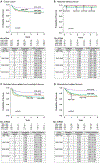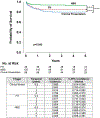Measuring the effect of newborn screening on survival after haematopoietic cell transplantation for severe combined immunodeficiency: a 36-year longitudinal study from the Primary Immune Deficiency Treatment Consortium
- PMID: 37352885
- PMCID: PMC10386791
- DOI: 10.1016/S0140-6736(23)00731-6
Measuring the effect of newborn screening on survival after haematopoietic cell transplantation for severe combined immunodeficiency: a 36-year longitudinal study from the Primary Immune Deficiency Treatment Consortium
Abstract
Background: Severe combined immunodeficiency (SCID) is fatal unless durable adaptive immunity is established, most commonly through allogeneic haematopoietic cell transplantation (HCT). The Primary Immune Deficiency Treatment Consortium (PIDTC) explored factors affecting the survival of individuals with SCID over almost four decades, focusing on the effects of population-based newborn screening for SCID that was initiated in 2008 and expanded during 2010-18.
Methods: We analysed transplantation-related data from children with SCID treated at 34 PIDTC sites in the USA and Canada, using the calendar time intervals 1982-89, 1990-99, 2000-09, and 2010-18. Categorical variables were compared by χ2 test and continuous outcomes by the Kruskal-Wallis test. Overall survival was estimated by the Kaplan-Meier method. A multivariable analysis using Cox proportional hazards regression models examined risk factors for HCT outcomes, including the variables of time interval of HCT, infection status and age at HCT, trigger for diagnosis, SCID type and genotype, race and ethnicity of the patient, non-HLA-matched sibling donor type, graft type, GVHD prophylaxis, and conditioning intensity.
Findings: For 902 children with confirmed SCID, 5-year overall survival remained unchanged at 72%-73% for 28 years until 2010-18, when it increased to 87% (95% CI 82·1-90·6; n=268; p=0·0005). For children identified as having SCID by newborn screening since 2010, 5-year overall survival was 92·5% (95% CI 85·8-96·1), better than that of children identified by clinical illness or family history in the same interval (79·9% [69·5-87·0] and 85·4% [71·8-92·8], respectively [p=0·043]). Multivariable analysis demonstrated that the factors of active infection (hazard ratio [HR] 2·41, 95% CI 1·56-3·72; p<0·0001), age 3·5 months or older at HCT (2·12, 1·38-3·24; p=0·001), Black or African-American race (2·33, 1·56-3·46; p<0·0001), and certain SCID genotypes to be associated with lower overall survival during all time intervals. Moreover, after adjusting for several factors in this multivariable analysis, HCT after 2010 no longer conveyed a survival advantage over earlier time intervals studied (HR 0·73, 95% CI 0·43-1·26; p=0·097). This indicated that younger age and freedom from infections at HCT, both directly driven by newborn screening, were the main drivers for recent improvement in overall survival.
Interpretation: Population-based newborn screening has facilitated the identification of infants with SCID early in life, in turn leading to prompt HCT while avoiding infections. Public health programmes worldwide can benefit from this definitive demonstration of the value of newborn screening for SCID.
Funding: National Institute of Allergy and Infectious Diseases, Office of Rare Diseases Research, and National Center for Advancing Translational Sciences.
Copyright © 2023 Elsevier Ltd. All rights reserved.
Conflict of interest statement
Declaration of interests MST is a member of the Scientific Advisory Board for Proteios Technology. JMP has received royalties from Up-To-Date, and her spouse is employed by and owns stock in Invitae (a DNA sequencing company). MJC has received royalties from Up-to-Date and is on the scientific board of Homology Medicines, a gene therapy company, and is a data and safety monitoring board (DSMB) member for Bluebird Bio, Chiesi USA, and Rocket Pharmaceuticals. LFS is a member of the adjudication committee for Orchard Therapeutics and has received consulting fees from Takeda, CSL Behring, ADMA Biologics, Grifols, and Horizon. JH is on an Investigator-initiated grant at CSL Behring; is a consultant for ADMA, Horizon, and CIRM; and a clinical trial primary investigator (industry sponsored research) for Regeneron. LMB has received clinical trial support through the Fred Hutchinson Cancer Research Center by Medac including supply of treosulfan), is a member of the DSMB for clinical trials with Rocket Pharmaceuticals and Jasper Therapeutics, and has served on an advisory board for Horizon Therapeutics USA. BDS has undertaken ad-hoc consultancies for Sobi and Orchard Therapeutics. ShC is a member on the advisory board for SOBI. JJB is a member of an advisory board for Sobi and Horizon Therapeutics. GDEC has received consultancy fees from Miltenyi Biotech. FDG has received consultancy fees from GLG and Guidepoint Global, and is on the advisory board for Omerus. EBS is on the speaker's bureau for Sobi. EHC is an advisory board member for Pfizer. SP has received funding for the conduct of sponsored trials Atara Biotherapeutics, AlloVir, and Jasper Therapeutics and is on the advisory board for ADMA and Neovii; and is the inventor of IP Licensed to Atara with all rights assigned to Memorial Sloan Kettering Cancer Center. KES has served as a consultant for Enzyvant and the Immune Deficiency Foundation. AP is on the advisory boards for Orchard (MLD GT), Horizon, and Enzyvant, serves on the DSMB for ExCellTheraMK, and is a consultant for Enzyvant (2020). TCQ has been on the speaker's bureau and advisory board for Alexion Pharmaceuticals. SS is on the advisory board and provides consultancy for Graphite, Takeda, Janssen, Bristol Myers Squibb, data and safety monitoring committee for the National Heart, Lung, and Blood Institute (NHLBI), and Aruvant Sciences. HD was an advisor on an Eli Lilly Canada Scientific Advisory Board in April 2020. JWL in the past 12 months has been a speaker and consultant for Sobi; has been a speaker and consultant, and has received research funding from Horizon Therapeutics; has been a speaker, consultant, and on an advisory board for Pharming; has been a speaker and consultant for CSL Behring; is on the advisory board for ADMA Biologics; and is the site primary investigator for Therapure and a GreenCross employee and shareholder at Bluebird Bio. MAP has served on the advisory boards of Novartis, Medexus, Equillium, and Mesoblast; has received clinical study support from Adaptive and Miltenyi Biotech; and has received financial support for educational lectures for Miltenyi Biotech and Novartis. DBK is an inventor for the UC Regents on a lentiviral vector for gene therapy of ADA-SCID and is a member of the DSMB for Revcovi PEG-ADA (Chiesi USA). EH has received consultancy fees from JASPERS, Takeda, CSL-Behring, Octapharma, and Leadiant Biosciences. CCD is a member of the DSMB for Revcovi PEG-ADA and is a consultant for Orchard Therapeutics. All other authors declare no competing interests.
Figures


Comment in
-
Newborn screening for severe combined immunodeficiency: changing the landscape of post-transplantation survival.Lancet. 2023 Jul 8;402(10396):84-85. doi: 10.1016/S0140-6736(23)01057-7. Epub 2023 Jun 20. Lancet. 2023. PMID: 37352884 No abstract available.
References
-
- Buckley RH, Schiff SE, Schiff RI, et al. Hematopoietic stem-cell transplantation for the treatment of severe combined immunodeficiency. N Engl J Med 1999; 340(7): 508–16. - PubMed
-
- Gatti RA, Meuwissen HJ, Allen HD, Hong R, Good RA. Immunological reconstitution of sex-linked lymphopenic immunological deficiency. Lancet (London, England) 1968; 2(7583): 1366–9. - PubMed
-
- Antoine C, Muller S, Cant A, et al. Long-term survival and transplantation of haemopoietic stem cells for immunodeficiencies: report of the European experience 1968–99. Lancet 2003; 361(9357): 553–60. - PubMed
-
- Haddad E, Landais P, Friedrich W, et al. Long-term immune reconstitution and outcome after HLA-nonidentical T-cell-depleted bone marrow transplantation for severe combined immunodeficiency: a European retrospective study of 116 patients. Blood 1998; 91(10): 3646–53. - PubMed
Publication types
MeSH terms
Grants and funding
- U01 TR001263/TR/NCATS NIH HHS/United States
- U54 AI082973/AI/NIAID NIH HHS/United States
- UG3 TR003908/TR/NCATS NIH HHS/United States
- P30 CA008748/CA/NCI NIH HHS/United States
- U01 HL069294/HL/NHLBI NIH HHS/United States
- U54 NS064808/NS/NINDS NIH HHS/United States
- ZIA AI001222/ImNIH/Intramural NIH HHS/United States
- UG1 HL069254/HL/NHLBI NIH HHS/United States
- P30 CA042014/CA/NCI NIH HHS/United States
- U10 HL069254/HL/NHLBI NIH HHS/United States
- R13 AI094943/AI/NIAID NIH HHS/United States
- U01 AI126612/AI/NIAID NIH HHS/United States
- U24 CA076518/CA/NCI NIH HHS/United States
- R21 AI156583/AI/NIAID NIH HHS/United States
LinkOut - more resources
Full Text Sources
Medical
Research Materials

